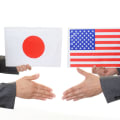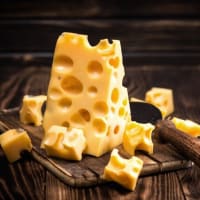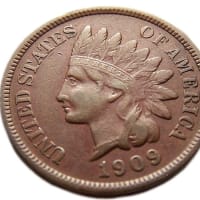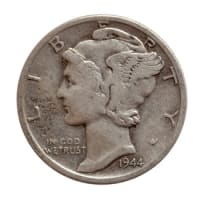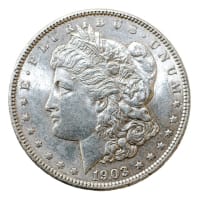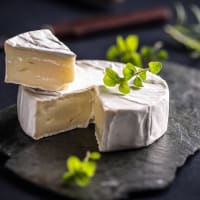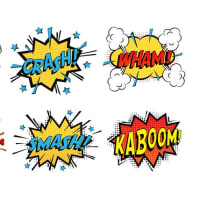Me Hey, Dali. In Japan, we sometimes refer to different types of fish as red-meat, white-meat, or hikarimono. How about in the US?
私 ねえダリちゃん。日本ではよく魚の種類を、赤身魚、白身魚、光り物なんて分けるけど、アメリカでもそうなの?
Dali No, we don’t distinguish between red-meat fish, white-meat fish, and hikarimono. We do not classify fish by the color of its meat; we only consider the name of the fish. We have tuna, we have flounder, we have sole, salmon…. Concerning fish, I think the big difference between the Japanese and English languages is simply that, in the latter, there are very few fishes to talk about.
ダリちゃん いや。赤身、白身、光り物を区別しないね。魚肉の色で分類はしないね。名前しか考慮に入れないね。マグロ、カレイ、ヒラメ、鮭……はあるけどね。魚に関しての日本語と英語の違いは、単純に、英語では魚について話す言葉がほとんどないことだね。
Me Is that so?
私 そうなの。
Dali Consider a typical American interview on the street, where the interviewer asks somebody, “Do you like fish?” The interviewee says, “Yes, I like fish.” Reporter continues, “What kind of fish do you like?” The man, thinking in his mind that fish is fish, replies, “Oh, I like tuna and flounder.” Reporter asks, “How do you prepare tuna?” The man says in response, “Oh, it’s in a can, canned tuna. Flounder is frozen flounder, and I cook it in a fry pan.” We don’t classify fish into red-meat or white-meat, because there are only three or four fishes that most people have ever eaten.
ダリちゃん アメリカでの街頭インタビューのよくある事例を考えてみよう。インタビューする人が道行人に「魚は好きですか?」と尋ねる。尋ねられた人は「ええ、魚は好きです」と答える。質問者は「どんな魚が好きですか?」と続ける。尋ねられた男性は、心では「魚は魚なんだけどな~」と思いながら「そうですね。マグロやカレイは好きですね」と答える。リポーターはさらに「マグロはどのように調理しますか?」と尋ねる。男性は「そうですね。マグロは缶詰で、カレイは冷凍をフライパンで焼きます」と答える。わしらは魚を赤身や白身に分けないね。多くの人が食べたことのある魚は3-4種類しかないからね。
Me Americans don’t know all that much about fish, do they?
私 アメリカ人は魚のこと知ってるのはその程度なんだ。
Dali I’m going to turn this around, and give you an example of the opposite situation. Suppose I am the new gaijin from America in Japan. Imagine I go to an okonomiyaki restaurant, and want to try some kind of cheese-yaki. So, I ask the Taisho what it’s like. The Taisho calls his daughter, Hiroko, to answer my question. The pretty girl says, “It is made of eggplant with tomato and cheese. It’s delicious.” I ask, “What kind of cheese?” She asks her father the same question, and Taisho says, “Don-na cheese-ka? Cheese-wa-cheese-da!” This is the same idea, where Americans think of fish is fish. For Americans, there are so many different cheeses, with different flavors, and Japanese psyche does not get this. There are 25 different cheeses: Cheddar, Gouda, Camembert, Ricotta, Mascarpone, Mozzarella, Brie, Roquefort, Gorgonzola…. But, for the Japanese, there are only three cheeses; slice cheese, melting cheese, and Yuki-jirushi Sankaku cheese. In respect to fish, the opposite is true. For the Japanese, there are so many fishes. Americans have no idea about them. In the same vein, the Japanese have no idea that there are so many cheeses.
ダリちゃん 話を変えて、反対の状況の例を言うね。わしが、アメリカから日本に来たばかりの外国人だとする。わしは、お好み焼き屋に行って「チーズ焼き」とかいうものを試したいとする。それで、大将に「チーズ焼きってどんなの?」と聞く。大将はわしの英語の質問に答えるため、娘の博子を呼ぶ。そのかわいい女性は「トマトとチーズがのった、なすの焼き物です。おいしいですよ」と言う。わしは「どんなチーズですか?」と尋ねる。彼女は大将に「お父さん。どんなチーズか? って言ってるよ」と言う。それを聞いた大将は「どんなチーズかって? チーズはチーズだ!」と言う。それは、アメリカ人が「魚は魚だ」と思うのと同じ考えだ。アメリカ人にとって、チーズには非常にたくさんの種類があって味も様々だが、日本人には分かりっこない。25種類の様々なチーズがあるんだ。チェダー、ゴーダ、カマンベール、リコッタ、マスカルポーネ、モッツアレラ、ブリ、ロックフォール、ゴルゴンゾーラ……。でも日本人には、チーズは3種類のみ。スライスチーズ、とろけるチーズ、それに雪印三角チーズ。魚に関しては、全く逆だ。日本人にとっては魚の種類はいっぱいある。アメリカ人には想像がつかない。同じ流れで、日本人はそんなにたくさんチーズに種類があるなんて考えもしない。
Me I got it. By the way, what kind of fish do you like?
私 よく分かった。ところで、ダリちゃんはどんな魚が好き?
Dali Me? My favorite fish is hikarimono. So, maybe aji (horse mackerel), kohada (gizzard shad), sayori (halfbeak), samma (saury). Samma-no-tsukuri is good. I like kisu (sillaginoid). I also like saba (mackerel). These are my favorite fishes. The fishes I don’t like are tai (sea bream) and mebaru (black rockfish)….
ダリちゃん わし? わしは光り物が好き。アジ、コハダ、サヨリ、サンマ。サンマの刺身はいいねえ。キスは好き。サバもね。これらは全部好き。嫌いな魚はね、鯛とメバル……。
Key Words (キーワード)
distinguish: 識別する、見分ける、区別する
tuna: マグロ、マグロの身
flounder: カレイ
sole: ヒラメ(カレイ=flounderとヒラメ=soleとしているが必ずしも両者の区別は厳格なものではない)
salmon: サケ
canned tuna: ツナ缶
interviewer: 会見者、面談者、インタビューアー
interviewee: 面接を受ける人、インタビューされる人
turn it around: 回転させる、方向を変える
eggplant: ナス
psyche: 魂、精神、心
in the same vein: 同じようなやり方(調子・感じ)で
Comments (コメント)
It doesn’t seem that ordinary Americans have much interest in fish. They would surely be startled when they see all the different kinds of sushi on the menu in an authentic sushi restaurant, except for Dali….
一般的なアメリカ人はあまり魚の事に興味がないようだ。すし屋に行ってネタの看板を見るとさぞかしびっくりするだろうね。ダリちゃん以外は……。



